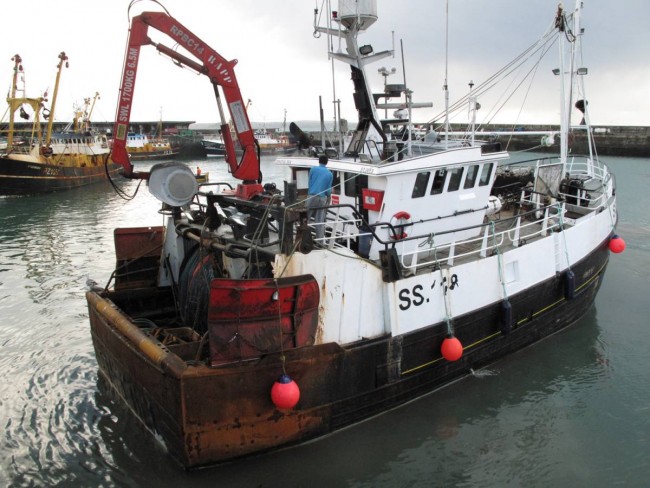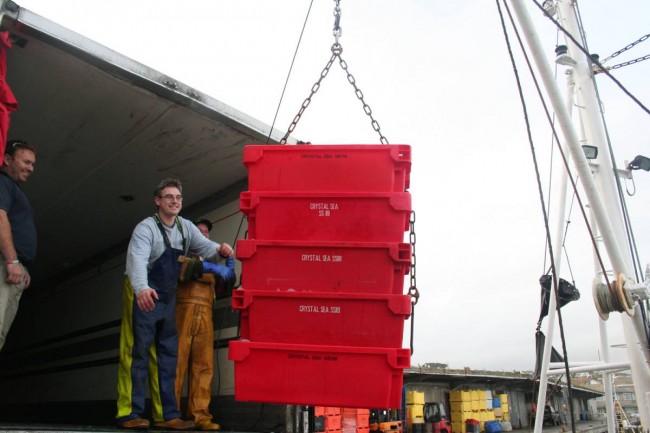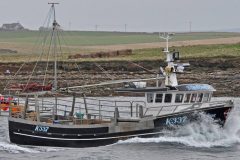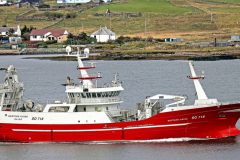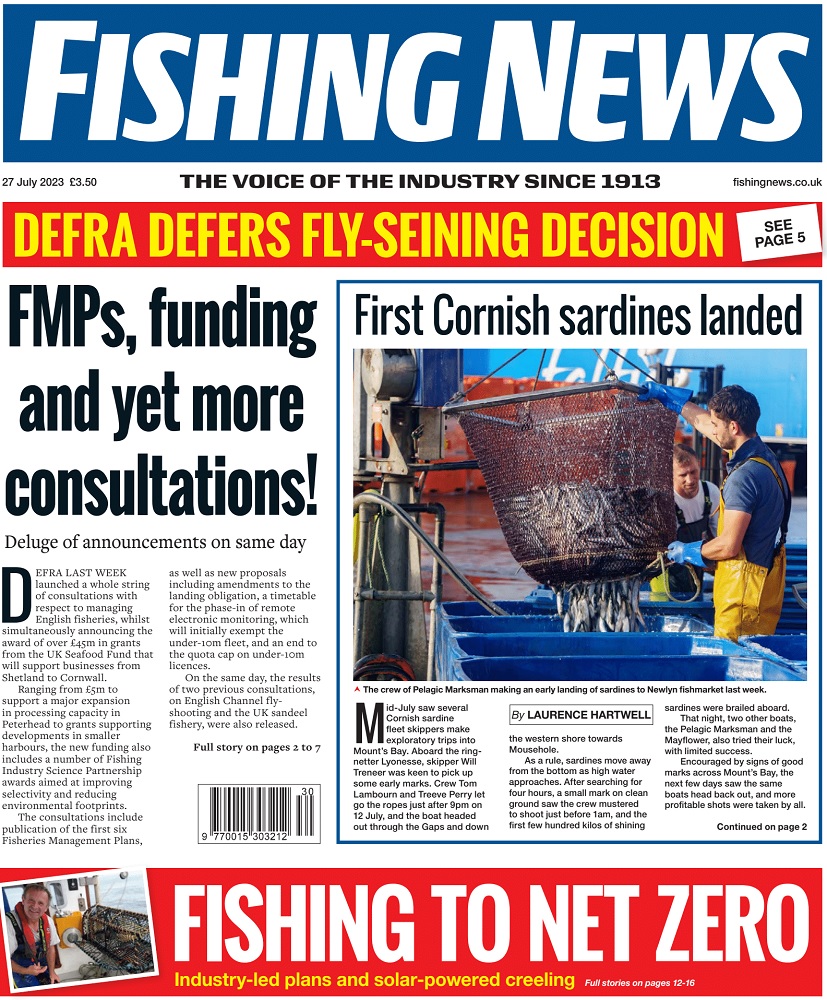Three years of the Catch Quota Trial (CQT), documenting catches, trialling selectivity gears and reducing all quota discards to just 2%, is about to come to an end, as, while the UK, Denmark and Norway were willing to allow the necessary quota uplift to remain in place, other EU member states voted down the continuation of the scheme.
Above: David Stevens senior (left) is now ashore, while sons David and Alec run Crystal Sea. David Stevens (middle) has just returned from telling MEPs in Brussels that the landing obligation will lead to most of the EU fishing fleet being tied up.
The Newlyn whitefish trawler Crystal Sea SS 118, operated by the Stevens family – father David, now ashore, and sons David and Alec who between them run the vessel – has been fitted with cameras as part of the CQT.
“I’m not a fan of cameras, especially not as an enforcement tool. But they are very good for gathering data, and as a scientific tool the cameras have proved their worth. This is the only tool that relays to the scientists and the policymakers the reality of what happens at sea,” David Stevens said, speaking to Fishing News after a presentation to MEPs in Brussels that he said left a few open mouths, as he described the realities of what the landing obligation will entail.
He said that the work the Crystal Sea has been doing as part of the CQT scheme is what should have been done before the landing obligation was even formulated.
“We don’t like cameras on board, it’s too much like having Big Brother watching you. But how else do we get the data across? There’s a fundamental issue of trust here – not with the fishermen, but with some of the NGOs and the policymakers, who treat what fishermen tell them as hearsay. Now we’re there with the evidence and it has to be believed. The camera doesn’t lie.”
PEW argues for higher discards
Looking towards next year, David Stevens said that if quotas are set on the basis of MSY being achieved in 2016, then they can expect a significant cut of as much as 27%, but the choice to aim for MSY by 2019 would provide the fleet with small increases each year.
“The scientists agree that the haddock stock is healthy. EDF is supportive of MSY by 2019 but PEW is demanding MSY by 2016 for all species, while the EU Commission’s wording is ‘wherever possible.’ So PEW is in effect arguing for higher discards – and we can back this up with data,” David Stevens said.
Avoiding haddock
David Stevens explained that the family-owned Crystal Sea embarked on the three-year CQT trials as they wanted to understand how their business would cope with choke species ahead of the coming discard ban.
“The first year we ran out of haddock quota by September, even though we fulfilled all of the CQT criteria,” he said.
The second year the Crystal Sea’s trials were extended to include monkfish and megrim as well as haddock, in a collaborative approach that brought in the MMO and CEFAS – and this was when David and Alec were closest to throwing in the towel over the levels of juvenile haddock. A dispensation for experimental gear, and a pragmatic approach by the MMO allowing them to test the trial gear against a standard control set of gear, resulted in their catches of juvenile haddock being reduced by close to 90%.
“The third year we overcooked it and went for a fully-documented fishery for all species, to see how we could cope with the landing obligation. We fulfilled all of the CQT requirements, and we were still out of quota by November,” David Stevens said.
“We reduced our overall haddock catch by 80% by using a coverless trawl, rigged with an agitator, a 30 x 10 (120mm) square mesh panel and 106mm codend meshes. For half of the year we haven’t towed at night, plus we have taken spatial measures. We’ve spent all year doing everything we can to avoid haddock, and we still ran out of quota.
“This tells me that, for us, the landing obligation can’t work. This isn’t just about us. The whole EU fleet could be decimated.”
The Stevens family has made a significant economic sacrifice in doing this work; losing 90% of their whiting catches along with the small haddocks, and 50% of the squid they would normally expect to catch, as well as a substantial amount of the high-value sole and lemon sole they would usually catch.
“Just not towing at night has cost us £4,000 a week. We have run the boat on landing obligation lines and even with the 5% uplift, we’re out of quota. We’re in a good position, so if we can’t make it work, how will anyone else?” David asked.
“This tells us that it’s time to look at policy. That’s where the problems are, not with poor fishing practices. There’s more than enough top-down regulation already, and it should be up to the fishermen to decide what selectivity devices they use. Fishing mortality has already been heading downwards for some years and we need to look at policy, especially around the choke species, for example, hake and monk in the North Sea, cod for the smaller boats in VIId and haddock down here in the south-west. These choke species all within mixed fisheries will tie the fleet up.”
David Stevens commented that these multi-layered problems require examination of historical catches, relative shares and the movement of fish populations, as well as the problems of spurdogs and boarfish that are another issue that also need attention.
“We need to look at ideas such as buffer quota and catch composition rules, as in Norway, if this is going to be made to work,” he said. “A more pragmatic approach to mixed fisheries is required. It’s just common sense.”
Merit in cameras
Skipper David Stevens commented that the cameras on board were not easy to get used to, but their value as a scientific tool that provides evidence has to be recognised. Crystal Sea’s crew has been essentially doing the work of the scientists, splitting catches to record them precisely by weight, and passing everything, discards included, along the belt under the cameras to make it visible to the MMO.
“Alec and I have played our part and worked closely with the scientists and MMO to get this work right. But it has to be recognised that it isn’t a case of fitting cameras and going to sea,” he said, commenting that it entails getting procedures right to handle catches, and this means more time on deck for the crew.
“We can see the merit in continuing with the cameras. This has proved the point that landing obligation policy needs to be re-thought,” he said, and added that the cameras provide the authorities with valuable information, but there is no real need for universal camera coverage.
“Two or three boats with active cameras in an area is enough to provide a picture of the fishery at any one time,” he said. “We need to see the cameras as more than just an enforcement tool, we need to see them as a scientific tool. I think we’ve only scratched the surface of what they can achieve.”
“As an industry we are suffering from a lack of trust in the system, this is not entirely our fault but to gain the flexibilities, we need to pursue our fisheries in a balanced way. We need to prove the merits of greater flexibility in policy and recognise we need to bridge this gap to be able to achieve the balanced fisheries we know can be achieved.”
Read more from Fishing News here…


Three years of the Catch Quota Trial (CQT), documenting catches, trialling selectivity gears and reducing all quota discards to just 2%, is about to come to an end, as, while the UK, Denmark and Norway were willing to allow the necessary quota uplift to remain in place, other EU member states voted down the continuation of the scheme.
Above: David Stevens senior (left) is now ashore, while sons David and Alec run Crystal Sea. David Stevens (middle) has just returned from telling MEPs in Brussels that the landing obligation will lead to most of the EU fishing fleet being tied up.
The Newlyn whitefish trawler Crystal Sea SS 118, operated by the Stevens family – father David, now ashore, and sons David and Alec who between them run the vessel – has been fitted with cameras as part of the CQT.
“I’m not a fan of cameras, especially not as an enforcement tool. But they are very good for gathering data, and as a scientific tool the cameras have proved their worth. This is the only tool that relays to the scientists and the policymakers the reality of what happens at sea,” David Stevens said, speaking to Fishing News after a presentation to MEPs in Brussels that he said left a few open mouths, as he described the realities of what the landing obligation will entail.
He said that the work the Crystal Sea has been doing as part of the CQT scheme is what should have been done before the landing obligation was even formulated.
“We don’t like cameras on board, it’s too much like having Big Brother watching you. But how else do we get the data across? There’s a fundamental issue of trust here – not with the fishermen, but with some of the NGOs and the policymakers, who treat what fishermen tell them as hearsay. Now we’re there with the evidence and it has to be believed. The camera doesn’t lie.”
PEW argues for higher discards
Looking towards next year, David Stevens said that if quotas are set on the basis of MSY being achieved in 2016, then they can expect a significant cut of as much as 27%, but the choice to aim for MSY by 2019 would provide the fleet with small increases each year.
“The scientists agree that the haddock stock is healthy. EDF is supportive of MSY by 2019 but PEW is demanding MSY by 2016 for all species, while the EU Commission’s wording is ‘wherever possible.’ So PEW is in effect arguing for higher discards – and we can back this up with data,” David Stevens said.
Avoiding haddock
David Stevens explained that the family-owned Crystal Sea embarked on the three-year CQT trials as they wanted to understand how their business would cope with choke species ahead of the coming discard ban.
“The first year we ran out of haddock quota by September, even though we fulfilled all of the CQT criteria,” he said.
The second year the Crystal Sea’s trials were extended to include monkfish and megrim as well as haddock, in a collaborative approach that brought in the MMO and CEFAS – and this was when David and Alec were closest to throwing in the towel over the levels of juvenile haddock. A dispensation for experimental gear, and a pragmatic approach by the MMO allowing them to test the trial gear against a standard control set of gear, resulted in their catches of juvenile haddock being reduced by close to 90%.
“The third year we overcooked it and went for a fully-documented fishery for all species, to see how we could cope with the landing obligation. We fulfilled all of the CQT requirements, and we were still out of quota by November,” David Stevens said.
“We reduced our overall haddock catch by 80% by using a coverless trawl, rigged with an agitator, a 30 x 10 (120mm) square mesh panel and 106mm codend meshes. For half of the year we haven’t towed at night, plus we have taken spatial measures. We’ve spent all year doing everything we can to avoid haddock, and we still ran out of quota.
“This tells me that, for us, the landing obligation can’t work. This isn’t just about us. The whole EU fleet could be decimated.”
The Stevens family has made a significant economic sacrifice in doing this work; losing 90% of their whiting catches along with the small haddocks, and 50% of the squid they would normally expect to catch, as well as a substantial amount of the high-value sole and lemon sole they would usually catch.
“Just not towing at night has cost us £4,000 a week. We have run the boat on landing obligation lines and even with the 5% uplift, we’re out of quota. We’re in a good position, so if we can’t make it work, how will anyone else?” David asked.
“This tells us that it’s time to look at policy. That’s where the problems are, not with poor fishing practices. There’s more than enough top-down regulation already, and it should be up to the fishermen to decide what selectivity devices they use. Fishing mortality has already been heading downwards for some years and we need to look at policy, especially around the choke species, for example, hake and monk in the North Sea, cod for the smaller boats in VIId and haddock down here in the south-west. These choke species all within mixed fisheries will tie the fleet up.”
David Stevens commented that these multi-layered problems require examination of historical catches, relative shares and the movement of fish populations, as well as the problems of spurdogs and boarfish that are another issue that also need attention.
“We need to look at ideas such as buffer quota and catch composition rules, as in Norway, if this is going to be made to work,” he said. “A more pragmatic approach to mixed fisheries is required. It’s just common sense.”
Merit in cameras
Skipper David Stevens commented that the cameras on board were not easy to get used to, but their value as a scientific tool that provides evidence has to be recognised. Crystal Sea’s crew has been essentially doing the work of the scientists, splitting catches to record them precisely by weight, and passing everything, discards included, along the belt under the cameras to make it visible to the MMO.
“Alec and I have played our part and worked closely with the scientists and MMO to get this work right. But it has to be recognised that it isn’t a case of fitting cameras and going to sea,” he said, commenting that it entails getting procedures right to handle catches, and this means more time on deck for the crew.
“We can see the merit in continuing with the cameras. This has proved the point that landing obligation policy needs to be re-thought,” he said, and added that the cameras provide the authorities with valuable information, but there is no real need for universal camera coverage.
“Two or three boats with active cameras in an area is enough to provide a picture of the fishery at any one time,” he said. “We need to see the cameras as more than just an enforcement tool, we need to see them as a scientific tool. I think we’ve only scratched the surface of what they can achieve.”
“As an industry we are suffering from a lack of trust in the system, this is not entirely our fault but to gain the flexibilities, we need to pursue our fisheries in a balanced way. We need to prove the merits of greater flexibility in policy and recognise we need to bridge this gap to be able to achieve the balanced fisheries we know can be achieved.”
Read more from Fishing News here…

